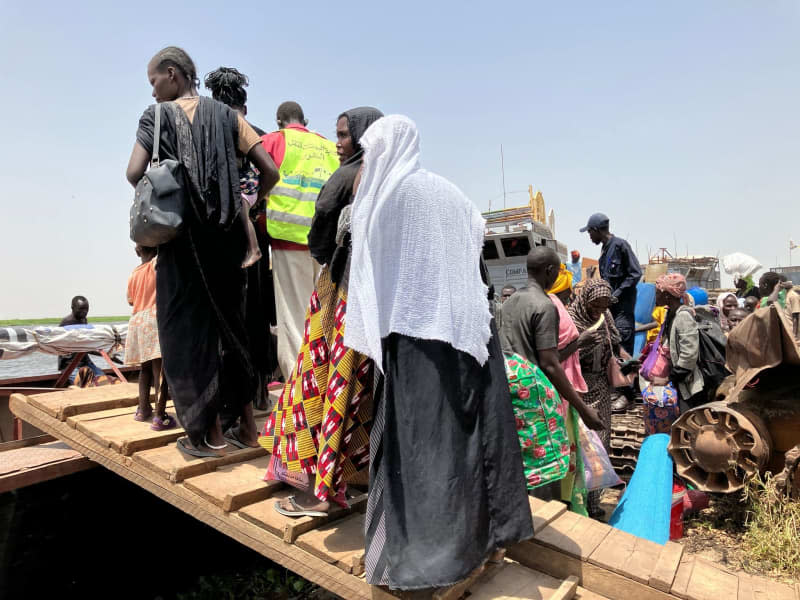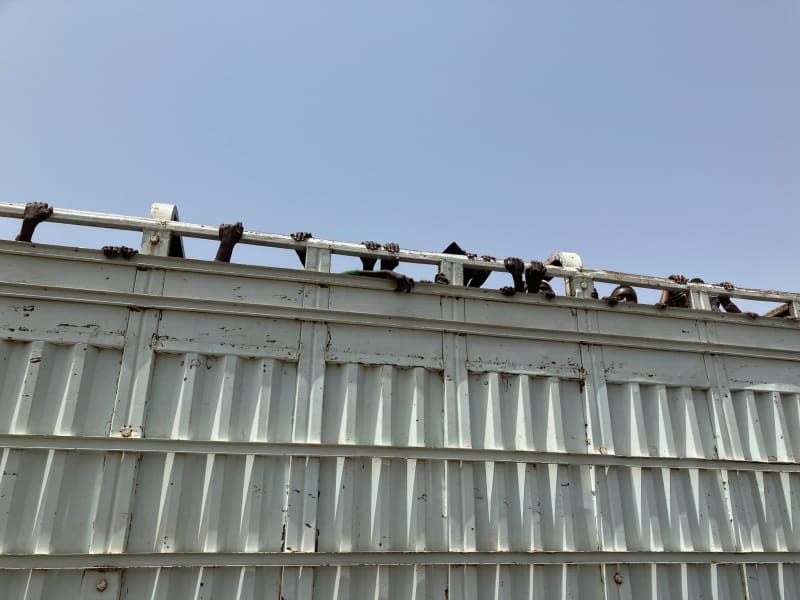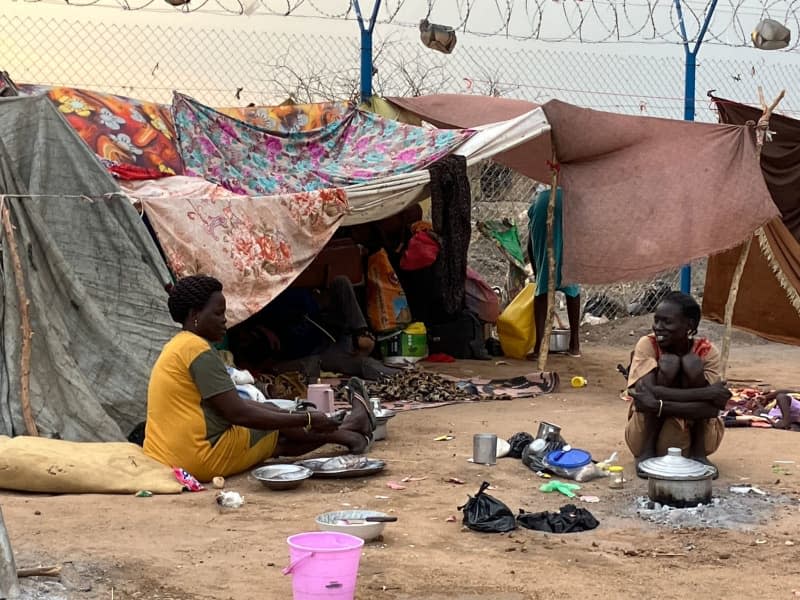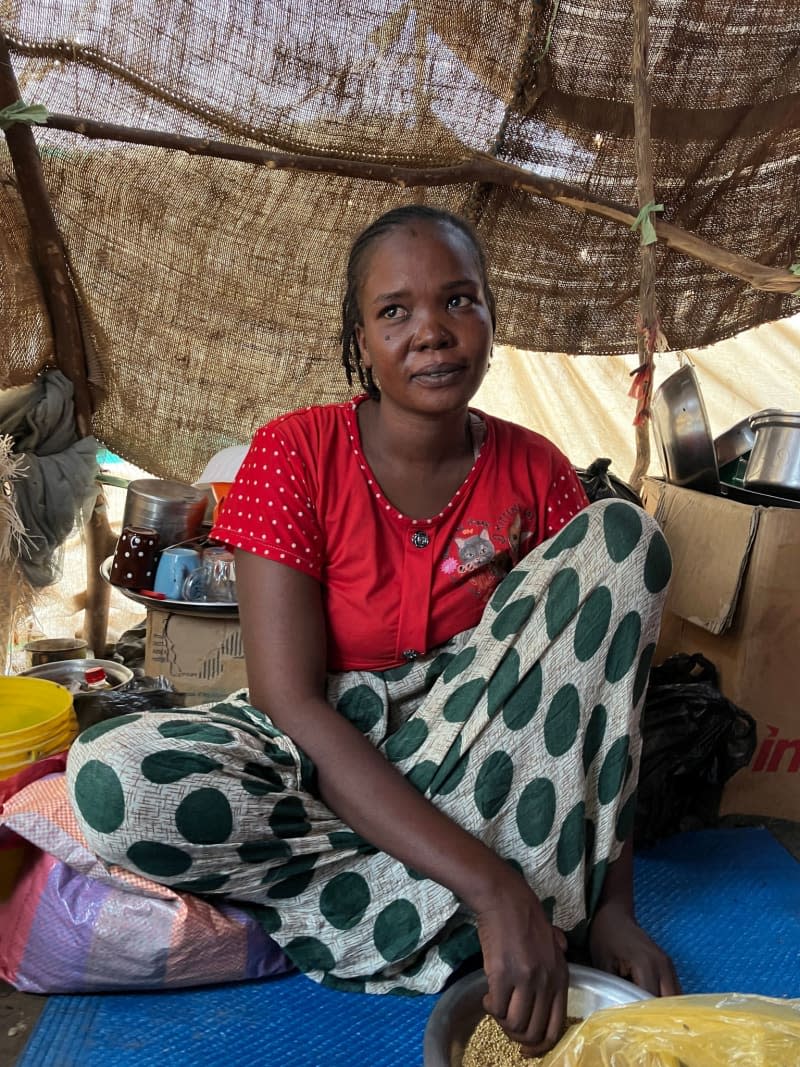Weary refugees wait in searing heat, hoping Sudan's conflict will end
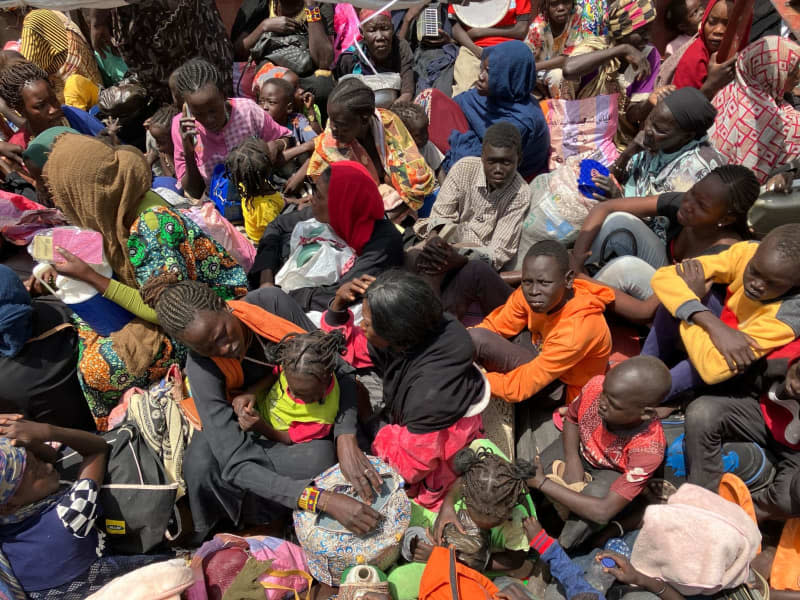
- Oops!Something went wrong.Please try again later.
Claudia Godid sits on a bed frame and pushes the green headscarf over her face to protect herself from the omnipresent dust. She looks wearily towards the two flagpoles that mark the border between South Sudan and Sudan, a good 100 metres away.
She has come to Joda border point from the Sudanese town of Rabak and originally lived in Khartoum.
"It was bad, very, very bad," Godid says of the start of Sudan's bloody conflict a year ago. "It was no longer safe – the airstrikes, the shootings. Many women were raped."
She wipes away a tear as she recalls horrors and the constant feeling of insecurity. She felt safe in Rabak for a long time, before shots were heard on the outskirts of town and armed men appeared.
“The whole community decided to leave,” Godid says. “I couldn't have stayed even if I wanted to. All the shops closed. Everyone just wanted to go.”
The dusty sand road linking Khartoum to the Joda border crossing is busy as more and more refugees cross the border. Most are women with children, but young men also flee the fighting in Sudan.
Those who can afford to rent donkey carts to make the journey with their luggage a little more comfortable.
For people from the village of Joda, the new arrivals mean an additional source of income. Money changers wait for customers just behind the border, shaded by a thorn bush with wads of Sudanese and South Sudanese pounds spread before them. “The conflict is good for our business,” says one with a shrug.
The border soldiers have retreatd to a straw hut as temperatures soar to more than 40 degrees Celsius. There have been no checks here for months, even though the Joda border post is used by almost all the 600,000 people who have fled from Sudan to the neighbouring country in the south.
“We have an open door policy,” says Albino Atol Atak Mayom, the humanitarian minister in Juba, the capital city. “These people are fleeing war. They have a right to be protected.”
The bloody power struggle between generals Abdel Fattah al-Burhan and Mohamed Hamdan Daglo began in Sudan a year ago. They once staged a coup together but now, each wants to decide the country's future alone.
Those who suffer are people like Godid and 1,500 other refugees who cross the border at Joda into South Sudan every day.
More than 9 million people have fled the conflict, according to the UN. It is the largest refugee crisis in the world though it rarely makes headlines, overshadowed by conflicts in the Middle East and Ukraine.
Renk, the small border town, was originally foreseen as a transit site but has been transformed by the arrival of so many refugees.
There are two transit centres where new arrivals are supposed to stay for two weeks at the most before continuing either to the Maban refugee camp or elsehwere in South Sudan.
But the sheer number of arrivals has thrown these plans into disarray. Some 15,000 refugees live in the camp that was designed for 3,000 people. There is no longer enough space in the barracks so many have to bed down elsewhere. Some have set up makeshift shelters hugging the fences, made out of sticks and blankets.
One is Aydel Naika, who reached safety with her nine children. She has come full circle as a native of South Sudan. She fled to Sudan in 2013 to escape the civil war in her homeland but fled south again due to the latest conflict. “When the bombs fell, we had no choice,” she says. “They affect everyone, whether civilians or militias.”
As an ethnic South Sudanese woman, she was exposed to attacks as she fled. “They beat us, they took all of our valuables,” she says of the young men who hunted down refugees along the way.
Now she hopes to rebuild her life and that of her children with relatives in Malakal. “I hope we are well received there,” she says.
In a barrack in the transit centre, Fatma Mohammed rocks her youngest child in her arms. After the conflict began, she escaped from Khartoum to Wad Madani in the Sudanese state of Jazira.
But fighting broke out there in December after an attack by Daglo's RSF militia.
The mother of four is Sudanese and her husband was a government employee. “I don’t know if he’s still alive, I fear the worst,” she says quietly.
An uncle who accompanied her rests on a straw mat in the barracks they share with five other families. Their future is even more uncertain than that of the ethnic South Sudanese, who are classified as returnees by the Juba government and are being resettled in their original home regions. For most though, these are foreign places that are unknown to their children.
Fatma Mohammed doesn't want to imagine a future in the refugee camp, possibly for years to come. “Maybe I’ll make it abroad,” she says. “For me, it is most important that my children can go back to school. They already lost a whole year due to the conflict."
She hopes that she can travel to Egypt, partly because Arabic is also spoken there and Sudan is not far away, for whenever she can return.
Aid organizations are trying to create structure for youngsters after the chaos of their flight. Social workers look after children in safe spaces, singing or painting with the little ones to give them a carefree hour or two at least.
But many children are traumatized and need psychosocial support. The transit centre is not actually designed for this, says Makuach Peter Deng of Save the Children rights group. “But we try to pass on information about children who need special support as soon as possible."
Human rights organizations accuse the parties to the conflict in Sudan of serious violations and violence against civilians: arbitrary shootings, rape, and sexual violence, including against children. Serious allegations have been made against the RSF militia in particular.
Meanwhile new trucks reach the Renk transit camp from the border every afternoon, crowded with refugees and their belongings.
Only the old, the sick and women with babies can get a slightly more comfortable bus ride to the transit camp. But even for them, the three-hour drive from Joda along the potholed dusty track is anything but pleasant.
Conditions are also painfully crowded on barges taking those who can leave the camp on the White Nile to the city of Malakal.
More than 500 people are crowded onto the boats, sitting on bundles of their belongings. Few can afford drinking water, so most fill bottles and containers from the river before setting off. There is no toilet or washing facilities.
Even before the boats depart for the three-day journey, children lie apathetically in their mothers' arms while others cry. No one has space to move or even stretch their legs.
Some, despite the increasingly precarious conditions, prefer to stay close to the border where they wait for news about missing relatives in Sudan.
Among them are Katmalla Mahdi, 29, and her four friends. All are desperate to hear where their husbands are, but Sudanese internet and mobile networks are disrupted and the women fear they may now be widows.
They fled fighting in Wad Madani to South Sudan in December. At the time they received food for the two weeks they were supposed to stay in the Renk transit camp but have been forced to improvise ever since.
“We sold clothes to be able to buy food,” says Katmallah. One of her friends mashes sorghum after carefully measuring out grains from a cup. She needs to ensure there is enough for everyone, including the children outside, though no one will have their fill.
“We support each other,” she says. They live in a shabby, tentlike construction that is a safe haven where they console or encourage each other when they are sad or exhausted.
“Our friendship gives us the strength we need to get through all this," Katmallah says with a weak smile. The five women can barely imagine what the future holds and when the conflict at home will end.
“It's hard to hope. We can only pray that things get better.”
